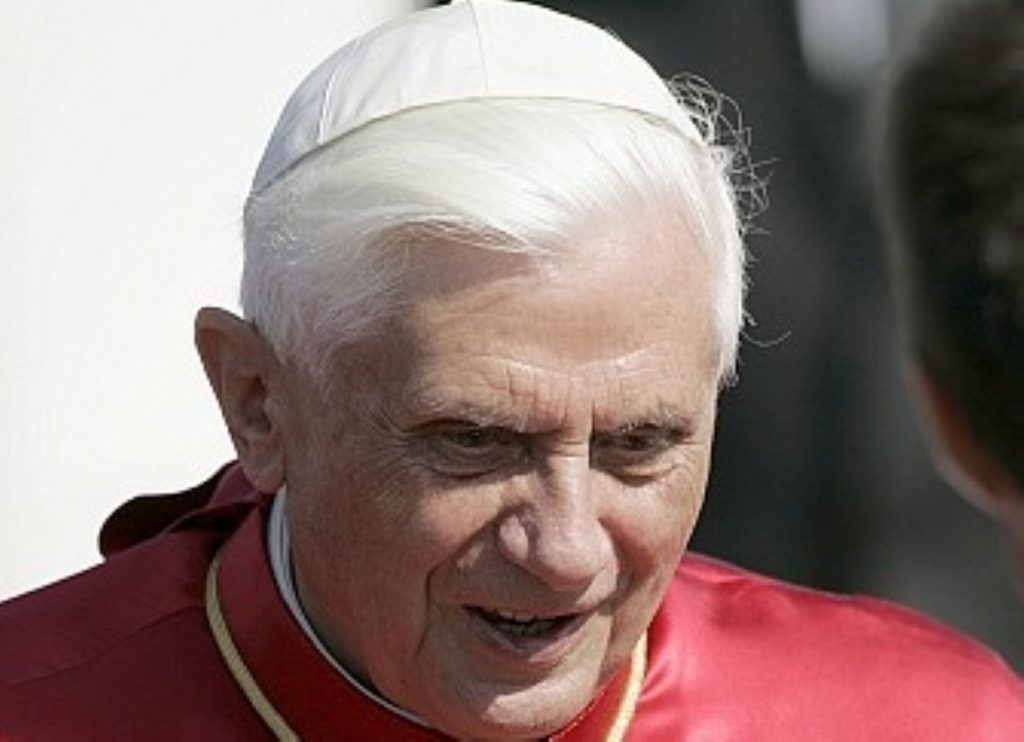Pope arrives in Britain warning of ‘atheist extremism’
By Ian Dunt
Pope Benedict XV has arrived in Britain promoting an outspoken anti-secular message sure to further anger his opponents.
In a speech outside Holyrood House, the Pope warned against “aggressive forms of secularism” and “atheist extremism”.
The comments had strong overtones of those which came from his advisor, Cardinal Walter Kasper, who stepped out of the trip yesterday after a German magazine quoted him saying the UK was in the grip of “a new and aggressive atheism”.


The Pope’s decision to deliver a highly political speech while stood next to the Queen will enhance the sense that he has come with a warning about the direction of British society.
Concluding a passage on the Nazis, he said: “As we reflect on the sobering lessons of the atheist extremism of the Twentieth Century, let us never forget how the exclusion of God, religion and virtue from public life leads ultimately to a truncated vision of man and of society and thus to a reductive vision of the person and his destiny.”
He added: “Today, the United Kingdom strives to be a modern and multicultural society. In this challenging enterprise, may it always maintain its respect for those traditional values and cultural expressions that more aggressive forms of secularism no longer value or even tolerate.
Poll: Should the Pope be making political speeches?
“Let it not obscure the Christian foundation that underpins its freedoms; and may that patrimony, which has always served the nation well, constantly inform the example your government and people set before the two billion members of the Commonwealth and the great family of English-speaking nations throughout the world.”
The comments instantly triggered an angry response from secular groups, who took particular exception to a mention of the Nazi’s earlier in the speech.
“The notion that it was the atheism of Nazis that led to their extremist and hateful views or that somehow fuels intolerance in Britain today is a terrible libel against those who do not believe in God,” said a spokesperson from the British Humanist Association (BHS).
“The notion that it is non-religious people in the UK today who want to force their views on others, coming from a man whose organisation exerts itself internationally to impose its narrow and exclusive form of morality and undermine the human rights of women, children, gay people and many others is surreal.”
It is the first ever official state visit to the UK from the head of the Vatican, but the trip has been hounded by controversy and protest.
It is the first papal visit of any sort since 1982, when Pope John Paul II visited at the invitation of Catholics in the UK.
Pope Benedict XVI’s arrival as a head of state rather than a religious leader has angered many protestors, who say the Vatican’s status as a nation state is merely a useful and arbitrary fiction reflecting the disproportionate power of the church.
They are also enraged by the pope’s alleged role covering up child abuse by Catholic priests and his views on a host of moral issues, including homosexuality and abortion.
The antipathy towards him was not made any easier by Cardinal Walter Kasper’s comments to a German magazine branding the UK a “Third World country” because of its multiculturalism.
Pope adviser brands UK ‘Third World country’
He has now pulled out the trip citing a medical condition, but it prompted the head of the Scottish Catholic Church to demand an apology.
Top Scottish Catholic demands apology for ‘Third World’ comment
The Pope landed in Edinburgh, where he met the Queen at Holyrood House. He shook hands with deputy prime minister Nick Clegg and Scottish first minister Alex Salmond.
“I am delighted to welcome you to the UK, and particularly to Scotland, on your first visit as Pope,” the Queen said during a speech outside Holyrood House.
“Much has changes in the world during the nearly 30 years since Pope John Paul II’s visit.
“The Holy See continues to have an important role in international issues,” she continued.
“Your presence here today reminds us of our common Christian heritage.
“On behalf of the people of the UK I wish you a most fruitful and memorable visit.”
Thousands of people gathered in Glasgow later for an open-air mass.
Some analysts believe the visit to the UK reflects Vatican concerns about the lack of church attendance in the country. Many figures within the Vatican view Britain as a secular stronghold and want a ‘bridge-building’ trip to increase the role of faith in the society.
Tory party chairman Sayeeda Warsi seemed happy to compliment that mission statement when she told Church of England bishops the coalition government does “do God”.
Warsi: The coalition ‘does God’
The phrase comes from Alastair Campbell, who famously told journalists the Labour government “doesn’t do God”, despite Tony Blair’s faith.
Baroness Warsi wants a greater role for faith groups in public service provision, but many of her Liberal Democrat coalition partners are committed atheists.
That includes deputy prime minister Mr Clegg, who will spend ten minutes discussing climate change with the Pope later in the trip.
Mr Clegg will be on his best behaviour though. His Spanish wife, Miriam, is a Roman Catholic.









